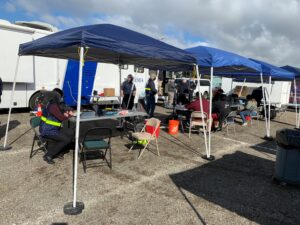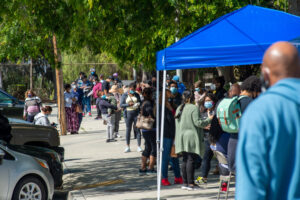DoorDash donates $1 million in gift cards to be distributed via community-based organizations partnering with Cal OES on vaccination operations
The California Governor’s Office of Emergency Services (Cal OES) today announced a $1 million donation from technology company DoorDash in the form of $25 DoorDash gift cards. This new partnership also aims to bolster the outreach efforts of Mobile Vaccination Clinics (MVCs) and Community Vaccination Clinics (CVCs).

Mobile Vaccination Clinic in Oakland hosted by the Native American Health Center
“As a critical component in our fight against COVID-19, we have prioritized making these vaccines and our distribution points for the vaccines as equitable and accessible as possible,” said Cal OES Director Mark Ghilarducci. “Meanwhile, we recognize in this effort to reach all Californians equitably, we need our partners in the private sector, like DoorDash, to make this possible. Cal OES is very appreciative of DoorDash and their contribution to support vaccine distribution in our communities hit hard by COVID-19.”
The gift cards will be distributed via community-based organizations partnering with Cal OES as part of the state’s vaccination operations. These organizations will ensure the donations reach residents and volunteers in historically underrepresented areas to continue the state’s effort for equity during vaccination outreach. In addition to supporting vaccine outreach and volunteerism efforts, the gift cards will help frontline workers and volunteers, as well as those receiving the vaccine focus on helping others or staying healthy without worrying about preparing or obtaining a meal for themselves and their families.
“DoorDash is proud to partner with the Cal OES to provide a $1 million donation of gift cards to support COVID-19 vaccine outreach and participation in underserved communities in California. Ensuring easy, equal, and informed access through this process will be key to the final stages and recovery from this public health crisis. We are grateful for the leadership of Cal OES and community organizations who are working tirelessly to broaden access to the vaccine,” said Sueli Shaw, Head of Social Impact at DoorDash.

Mobile Vaccination Clinic at Jesse Owens Park in Los Angeles hosted by Charles R. Drew University
“DoorDash’s generous contribution demonstrates how business, philanthropy, and state government can leverage resources and relationships to support community-based organizations in their efforts to keep vulnerable communities safe and healthy. These gift cards will help nourish the frontline workers and committed volunteers at vaccination sites in communities disproportionately impacted by COVID-19 and those in need of food support during these difficult times,” said Kaying Hang, Senior Vice President of Programs and Partnerships, The Center at Sierra Health Foundation.
As of April 3, Cal OES and FEMA have administered over 611,000 vaccines, with nearly 83,500 administered at targeted mobile clinics designed to reduce barriers to access for historically underserved communities. The community-based organizations receiving DoorDash gift cards are located in Los Angeles, the East Bay, and the Central Valley and many have worked closely with Cal OES to host vaccination clinics. They have been instrumental in bolstering the state’s equitable vaccination efforts.
Launched in January, DoorDash’s Community Credits program provides non-profit organizations with DoorDash gift cards in order to help them empower the communities they serve, reduce food insecurity as a barrier for their target audiences, and encourage participation in programs that help them accomplish their mission. The program is one of the initiatives that highlights DoorDash’s commitment to supporting local businesses and communities that have been the hardest hit by COVID-19.
California’s statewide network of community-based organizations providing COVID outreach and education spans 337 community-based organizations supported through a $52.7 million public-private partnership.
###
